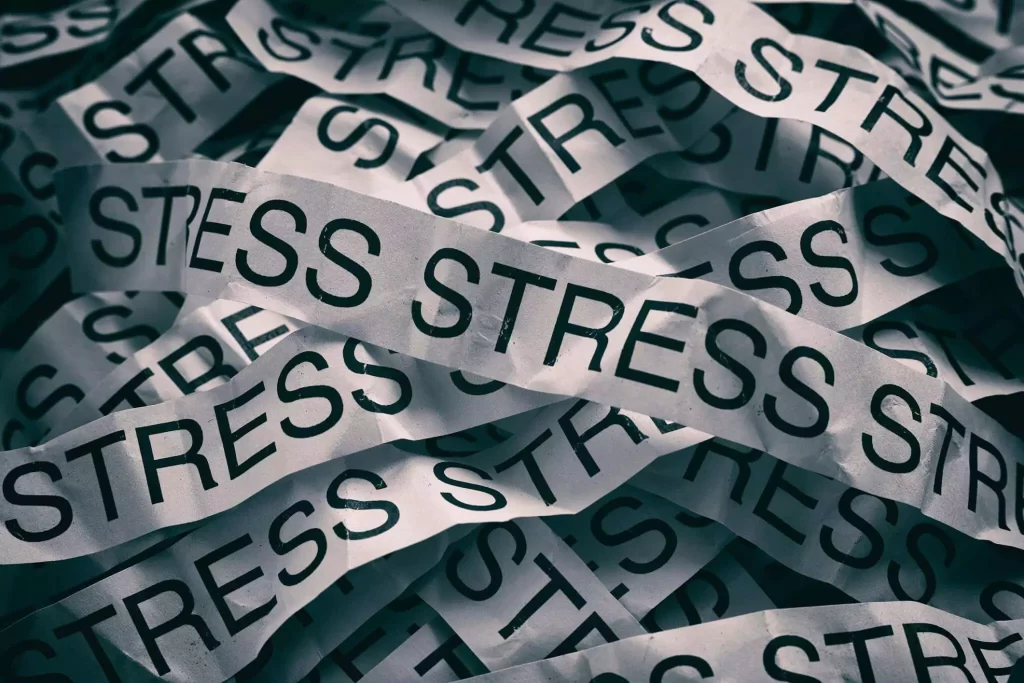Stress and Anxiety
How to Eliminate Stress: 10 Effective Strategies for a Peaceful Mind
What is Stress?
Stress is a natural response that our bodies have when we are faced with demanding or challenging situations. It is the body’s way of preparing itself to deal with a perceived threat or danger. When we encounter a stressful situation, our bodies release stress hormones such as cortisol and adrenaline, which trigger a series of physiological responses. These responses can include increased heart rate, rapid breathing, and heightened alertness.
While stress can be helpful in certain situations, such as when we need to quickly react to a dangerous situation, prolonged or chronic stress can have negative effects on our health and well-being. Chronic stress can lead to a variety of physical and mental health problems, including high blood pressure, weakened immune system, anxiety, depression, and insomnia.
There are many factors that can contribute to stress, including work pressure, financial difficulties, relationship problems, and major life changes. Each person may experience and respond to stress differently. It is important to recognize the signs and symptoms of stress and take steps to manage it effectively.
There are several strategies that can help reduce and manage stress. These include practicing relaxation techniques such as deep breathing exercises, meditation, and yoga. Regular exercise is also an effective way to reduce stress as it releases endorphins, which are natural mood elevators. Additionally, maintaining a healthy lifestyle by getting enough sleep, eating a balanced diet, and avoiding excessive alcohol and caffeine consumption can help reduce stress levels.
It is also important to establish healthy coping mechanisms and prioritize self-care. This can involve setting boundaries, learning to say no, and seeking support from friends, family, or a mental health professional when needed. Finding activities that bring joy and relaxation, such as hobbies or spending time in nature, can also help alleviate stress.
In conclusion, stress is a natural response that our bodies have to challenge situations. While it can be helpful in certain situations, chronic stress can have negative effects on our health and well-being. By implementing effective stress management strategies and prioritizing self-care, we can reduce and better manage stress in our lives.
Symptoms of Stress

Stress can manifest in a variety of ways, and it’s important to recognize the symptoms so that you can take steps to manage and reduce stress in your life. Some common symptoms of stress include physical symptoms such as headaches, muscle tension, and fatigue. You may also experience changes in appetite, either eating too much or too little. Sleep disturbances, such as insomnia or excessive sleeping, can also be a sign of stress. On an emotional level, stress can lead to feelings of irritability, anxiety, and sadness. You may find yourself becoming easily overwhelmed or having difficulty concentrating. Stress can also affect your behavior, causing you to withdraw from social activities, engage in unhealthy coping mechanisms (such as excessive drinking or smoking), or neglect self-care. It’s important to pay attention to these symptoms and seek support if you are experiencing chronic or overwhelming stress. Taking steps to manage stress, such as practicing relaxation techniques, engaging in regular exercise, and seeking support from friends, family, or professionals, can help improve your overall well-being.
10 Common Causes of Stress
Workload – Balancing responsibilities and meeting deadlines can be a major source of stress in many people’s lives. Learning how to effectively manage your workload and prioritize tasks can help alleviate stress.

Financial difficulties – Money troubles, such as excessive debt or living paycheck to paycheck, can cause significant stress. Seeking financial advice and creating a budget can help relieve the burden.

Relationship problems – Difficulties in personal relationships, whether it’s with a partner, family member, or friend, can be incredibly stressful. Open communication and seeking professional help, when needed, can make a difference.

Health issues – Dealing with chronic illnesses or facing medical concerns for yourself or loved ones can take a toll on your mental health. Seeking proper medical care and support is crucial in managing stress related to health issues.

Time management – Feeling overwhelmed by an overflowing schedule and lack of time for self-care can lead to stress. Prioritizing tasks, setting boundaries, and carving out time for relaxation is essential for reducing stress caused by poor time management.

Loss of a loved one – Grief is a natural response to losing someone close, and it often comes with intense emotional pain and stress. Seeking support from friends, family, or grief counseling services is crucial in coping with this type of stress.

Job insecurity – The fear of losing one’s job or dealing with job instability can cause considerable stress levels. Building up skills, networking connections, and creating emergency funds are ways to reduce job-related anxieties.

Life transitions – Major life changes like moving homes, starting college, and getting married/divorced are all significant sources of stress due to adjusting to new environments and expectations.

Social pressures – Constant pressure to fit societal norms, look a certain way, or maintain a specific lifestyle can lead to high levels of stress. Remembering that self-acceptance and individuality is more important than meeting others’ expectations can help manage this form of stress.

How to Overcome Stress
Declutter Your Space – A clean environment leads to a clear mind
One way to combat stress is by decluttering your physical surroundings. When your space is organized and free from unnecessary items, it can help create a sense of calm and reduce feelings of overwhelm.
Practice Mindfulness – Live in the present moment
Mindfulness is a powerful tool for managing stress. By focusing on the present moment and paying attention to your thoughts and feelings without judgment, you can cultivate a greater sense of awareness and reduce anxiety.
Engage in Physical Activity – Get moving for a stress-free life
Exercise has numerous benefits for both your physical and mental well-being. It releases endorphins, reduces symptoms of stress, and promotes better sleep. Find an activity you enjoy, whether it’s yoga, running, or dancing, and make it a regular part of your routine.
Connect with Nature – Find solace in the great outdoors
Nature has a calming effect on our minds and bodies. Spending time outdoors can help reduce stress levels, improve mood, and increase overall well-being. Whether it’s taking a walk in the park or going for a hike, make an effort to connect with nature regularly.
Seek Support – Reach out to those who care
Don’t hesitate to ask for help when you feel overwhelmed by stress. Reach out to friends, family members, or seek professional support if needed. Talking about your feelings can provide you with valuable insights and support during challenging times.
Prioritize Self-Care – Make time for activities that bring you joy
Self-care is essential for managing stress effectively. Take time out of your day to engage in activities that bring you joy and relaxation, whether it’s reading a book, taking a bath, or practicing self-reflection through journaling.
Practice Deep Breathing – Harness the power of your breath
Deep breathing exercises are an easy and effective way to reduce stress at the moment. By slowing down your breathing and focusing on taking deep breaths, you can activate your body’s relaxation response and calm your mind.
Limit Screen Time – Unplug for a stress-free environment
Constant exposure to screens can contribute to feelings of stress and anxiety. Set boundaries for yourself and establish designated screen-free times or areas in your home to create a more peaceful environment.
Remember, managing stress is an ongoing process that requires consistent effort. By implementing these strategies into your daily routine, you can take steps towards overcoming stress and achieving a more balanced and fulfilling life.
Ayurvedic Treatment for Stress
Meditation – Finding inner peace and tranquility
Meditation has been practiced for thousands of years as a way to calm the mind, reduce stress, and promote overall well-being. With Ayurvedic principles, you can learn different meditation techniques tailored specifically to address stress and find your own path to inner peace.

Yoga – Balancing your mind, body, and soul
Yoga is a holistic practice that combines physical postures, breathing exercises, and mindfulness to promote harmony between the mind, body, and soul. Ayurvedic treatment for stress incorporates specific yoga poses and sequences that help release tension, improve circulation, and restore balance in your life.

Herbal Remedies – Nourishing your body from within
Ayurveda believes in the power of nature’s healing properties found in herbs and plants. By incorporating herbal remedies into your daily routine, you can naturally support your body’s ability to cope with stress. From adaptogenic herbs like ashwagandha to calming teas like chamomile or lavender, these remedies can help relax the mind and promote mental well-being.

Ayurvedic Massage – Rejuvenating your senses
Ayurvedic massage not only revitalizes your body but also calms the mind. Through specific techniques using warm oils infused with herbs and essential oils, this therapeutic practice helps relieve muscle tension, improve blood circulation, and release emotional stress stored in the body.

Lifestyle Changes – Creating harmony in everyday life
Ayurveda emphasizes creating a balanced lifestyle that supports overall well-being. This includes mindful eating habits, regular exercise routines tailored to your dosha (body type), maintaining proper sleep patterns, and finding time for self-care activities such as journaling or taking relaxing baths.

By incorporating these Ayurvedic treatments for stress into your life, you can cultivate a sense of calmness and balance while effectively managing stress levels in a natural way. Remember to consult with a qualified Ayurvedic practitioner or healthcare professional before starting any new treatment regimen.
FAQs (Frequently Asked Questions)

Q: Is stress always harmful?
A: Not all stress is harmful. Some stress can be beneficial and motivate you to perform better. However, chronic or excessive stress can have negative effects on your physical and mental well-being.
Q: Can stress be completely avoided?
A: It’s not possible to completely avoid all sources of stress in life. However, you can develop effective strategies to manage and cope with stress in a healthy way.
Q: How long does it take to see results from stress-reducing strategies?
A: The time it takes to see results may vary from person to person. Some strategies, such as deep breathing or taking breaks, can provide immediate relief. However, long-term benefits usually come with consistent practice over time.
Q: Are there any dietary changes that can help reduce stress?
A: While there are no specific foods that can directly eliminate stress, maintaining a healthy and balanced diet can support overall well-being and resilience to stress. Consuming nutrient-rich foods and avoiding excessive caffeine and sugar can contribute to a healthier mind and body.
Q: Can technology help in reducing stress?
A: Technology can be both helpful and detrimental to stress management. While certain apps and tools, like meditation or relaxation apps, can assist in stress reduction, excessive screen time and social media can contribute to stress. It’s important to find a balance and use technology mindfully.
Q: Are there any natural supplements or herbs that can help with stress?
A: Some natural supplements and herbs, such as ashwagandha, chamomile, or lavender, have been associated with stress reduction. However, it’s important to consult with a healthcare professional before taking any supplements to ensure they are safe and suitable for you.
Q: What if my stress is caused by external factors beyond my control?
A: While you may not have control over certain external stressors, you can control your response to them. Focus on adopting stress-management techniques, building resilience, and seeking support from friends, family, or professionals to help you navigate difficult situations.
Q: Can stress lead to physical health issues?
A: Yes, chronic stress can have a negative impact on physical health. It has been linked to conditions like heart disease, high blood pressure, weakened immune systems, and digestive issues. Managing stress effectively is crucial for maintaining overall health.
Q: Can stress affect my sleep?
A: Yes, stress can disrupt sleep patterns and make it difficult to fall asleep or stay asleep. Incorporating stress-reducing techniques into your routine can help improve sleep quality.
Q: How does exercise help reduce stress?
A: Exercise releases endorphins, which are natural mood enhancers. It also helps reduce stress hormones like cortisol and promotes relaxation. Regular physical activity can significantly contribute to stress reduction.
Q: Can stress impact my relationships?
A: Chronic stress can put a strain on relationships, leading to conflicts and communication breakdowns. It’s important to manage stress effectively to maintain healthy relationships and seek support when needed.
Q: Can stress lead to mental health issues?
A: Prolonged or excessive stress can contribute to the development or exacerbation of mental health conditions such as anxiety and depression. Taking steps to manage stress is essential for maintaining good mental well-being.
Q: How does journaling help with stress reduction?
A: Journaling allows you to express your thoughts and emotions, providing a healthy outlet for stress. It can help you gain clarity, process your feelings, and identify patterns or triggers. Regular journaling can be a valuable stress management tool.
Q: Are there any relaxation techniques I can use in the moment when I feel stressed?
A: Yes, several relaxation techniques can help you manage stress in the moment. Deep breathing exercises, progressive muscle relaxation, or visualization techniques can be practiced anywhere, providing immediate relief.
Q: Can stress affect my productivity at work or school?
A: Yes, excessive stress can negatively impact your focus, concentration, and productivity. Learning effective stress management strategies can help you perform better and maintain a healthy work-life balance.
Q: Are there any specific stress management techniques for children or teenagers?
A: Yes, children and teenagers can benefit from stress management techniques tailored to their age group. These may include engaging in physical activities, creative outlets, mindfulness exercises, or seeking support from trusted adults or school counselors.
Q: Can stress affect my physical appearance?
A: Prolonged stress can manifest in physical symptoms such as skin problems, hair loss, weight changes, and weakened immune function. Reducing stress levels can positively impact your physical appearance.
Q: Can laughter help reduce stress?
A: Yes, laughter has been shown to have stress-relieving effects. It boosts mood, releases endorphins, and promotes relaxation. Engage in activities that make you laugh, such as watching a comedy show or spending time with loved ones.


